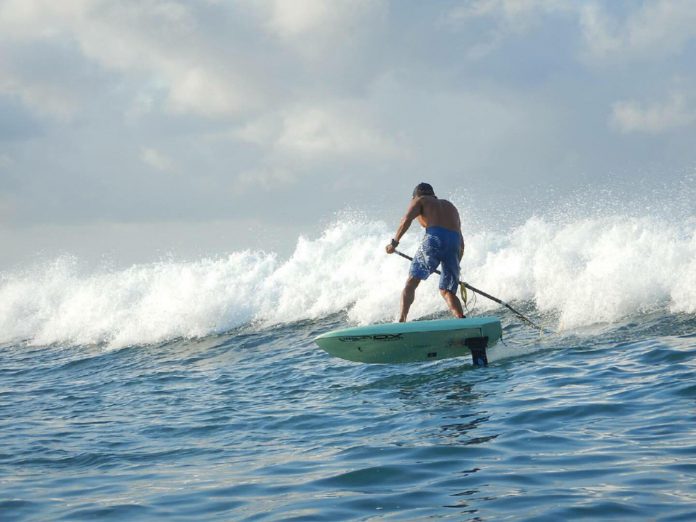By Douglas Thomas Moore
Zipping and gliding across wave faces seemingly effortlessly gathering momentum and a high rate of speed into whitewash, the “foil” surfer or stand up paddler look like they’re magically floating atop the wave action. You’ve seen them, and, you will see more “hydro foil” boarders as they gain in popularity, use, and numbers.
In my last installment, I said I would discuss how boaters, divers, and other ocean recreation users share responsibility for ocean maritime safety. “Hydro foil” board users are a growing concern for ocean safety and responsibility.
Are foil boards a safety issue? Should boaters, divers, and other ocean recreation users worry? What safety concerns are there? Can foil boarders be responsible and self-regulate foil safety concerns? Or, is DLNR Division of Boating and Ocean Recreation looking into this growing ocean recreation use with any eye to introducing new rules and regulations foil boarders may not like?
An immediate safety issue is free flying foils; that is if and when a foil boarder, without a proper leash, loses the board in a wave or in whitewash and the board continues to speedily fly towards shore potentially running over other boarders, or swimmers, or into boats, or into green sea turtles, or into reefs. A proper leash is an absolute must, especially for novices.
If you are a foil boarder, what liability might you have if you seriously injure other ocean recreation users, or a sea creature, or damage a reef or a boat? All these can result in your exposure to potentially substantial monetary damages. Do you have insurance coverage? Do you have a homeowner’s insurance policy you think might protect you? You must closely read your policy to see if there is an exclusion for water injury issues. Because if you do not have adequate insurance protection, your own personal assets, including your family home, could be exposed to legal jeopardy.
As for new governmental involvement in any safety issues, a review of the currently proposed amendments to Hawai`i Administrative Rules Sec. 13-230-4 does not appear to specifically address “hydrofoil boards”, but maybe by inference they do. In the proposed amended definitions of Sec. 13-230-8, numerous well-known items are defined including canoes, outrigger canoes, kayaks, paddleboards, paipo boards, water sports equipment, and thrill craft (which require DLNR safety certifications). Are “foil” boards potentially “thrill craft” which would require such DLNR safety certifications? Definitely something to think about and consider especially since if in a “Recreational boating accident”, the law requires immediate notice of the recreational vessel involved (there is a potential $2,000.00 fine for failure to file notice). Sec. 13-242-3 and Sec. 13-242-4.
There are numerous YouTube videos you can watch for foil boarding information and lessons. First time foil surfing and awesome wipeouts should be watched so you can see foil safety concerns. One fascinating and highly informative popular video (50,000+ hits) features Hawaiian Watermen and foil pioneers Kalani Vierra, Leleo Kinimaka, and Sam Pa`e together for a talk story session sharing their wisdom and practical knowledge to promote hydro foiling safety and give tips to those wanting to get into foiling with pointers on choosing the right equipment. Safety gear and ocean etiquette is stressed. Respecting the environment is stressed. Respecting other ocean recreational users is stressed. Be a role model of safety and respect.
Foil novices must not forget their own safety. The board and foil can fly into you, so, don’t forget to wear a safety helmet and an impact vest (recommended in the foil pioneers’ video). The video foil Watermen also recommend buying your foil local, getting expert advice and oversight, take lessons, and arrange for a jet ski tow to get you up out of the water and hydro foil faster. Learn quicker, have fun, and respect the ocean and other ocean recreation users.
Douglas Thomas Moore, Personal Injury, Maritime and Longshore Law [email protected]







